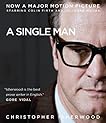 Single Man by Christopher Isherwood
Single Man by Christopher IsherwoodMy rating: 5 of 5 stars
I was drawn to read this book after seeing Tom Ford's film adaptation. The movie was so good, the narrative so personal and the images singularly beautiful, it made me want to know what kind of prose had inspired it. In that, Christopher Isherwood's way with words does not disappoint. His descriptions are vivid and poetic, telling us as much about the person who is viewing the surroundings as they do the surroundings themselves. The setting is actually pretty interesting: Southern California in the 1960s, a world in the midst of change, the very land being transformed by modernity. The main character, an aging professor, is of a different age, his obsolescence growing more pronounced by the paragraph. The world is passing him by.
Making it all the more interesting is that he is a man who was never part of the world, anyway. As a gay man, he was always outside whatever was normal or modern. A Single Man essentially chronicles a day in his life. George is lonely, grieving for his dead lover, enraged at the life that trundles on around. The pettiness of the inconsequential existences society chooses to accept as "regular" is not lost at him, and Isherwood lets George's interior invective flow. Interestingly enough, Ford teased a whole other story out of this, one that is more about the grief and also more sexual. Isherwood, who published this book in 1964, does nothing to hide George's gayness, but in the movie, it's like someone has struck the professor's libido with a tuning fork. No one is deaf to his desire. Ford also decides to make the day he depicts the one where George has decided to die, giving the film and otherworldy gravitas the book does not have. Instead, what makes the novel vibrant is George's incisive dissection of social drives and mores, and in the climax, when he declares his own somewhat tragic, some might say pathetic, position within those strictures, his acceptance opens the door hope and healing. It's interesting to note that though they take very different paths, both the original novel and the movie end up in the same place. The one distinct difference is that Tom Ford makes literal what is metaphor in Christopher Isherwood's ending, and Isherwood's images here resonate with much more strength than the movie's final scene.
View all my reviews >>
Current Soundtrack: The Complete Motown Singles Vol.8 : 1968
e-mail = golightly at confessions123.com * Criterion Confessions * Live Journal Syndication * My Corporate-Owned Space * ComicSpace * Last FM * GoodReads * The Blog Roll [old version] * DVDTalk reviews * My Books On Amazon
All text (c) 2010 Jamie S. Rich


No comments:
Post a Comment